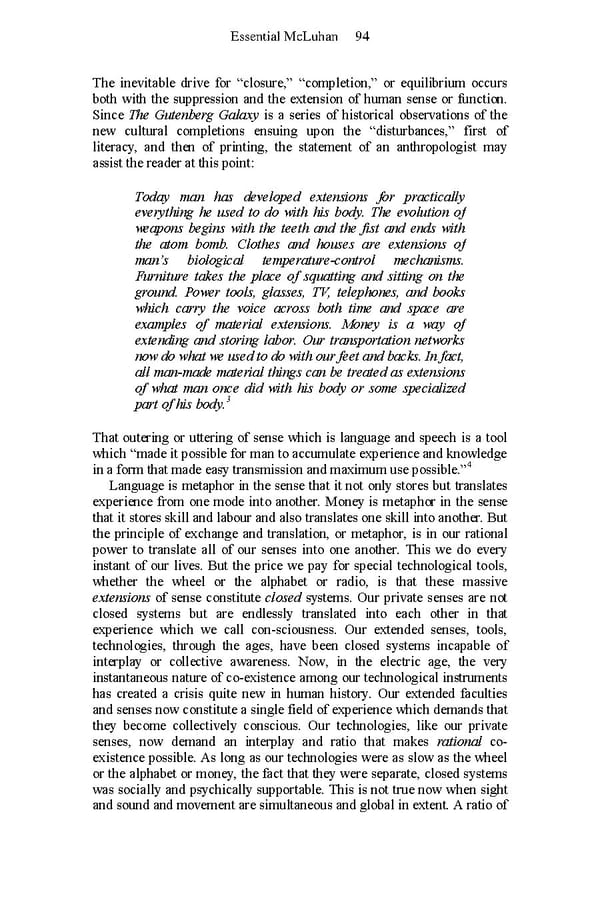Essential McLuhan 94 The inevitable drive for “closure,” “completion,” or equilibrium occurs both with the suppression and the extension of human sense or function. Since The Gutenberg Galaxy is a series of historical observations of the new cultural completions ensuing upon the “disturbances,” first of literacy, and then of printing, the statement of an anthropologist may assist the reader at this point: Today man has developed extensions for practically everything he used to do with his body. The evolution of weapons begins with the teeth and the fist and ends with the atom bomb. Clothes and houses are extensions of man’s biological temperature-control mechanisms. Furniture takes the place of squatting and sitting on the ground. Power tools, glasses, TV, telephones, and books which carry the voice across both time and space are examples of material extensions. Money is a way of extending and storing labor. Our transportation networks now do what we used to do with our feet and backs. In fact, all man-made material things can be treated as extensions of what man once did with his body or some specialized part of his body.3 That outering or uttering of sense which is language and speech is a tool which “made it possible for man to accumulate experience and knowledge in a form that made easy transmission and maximum use possible.”4 Language is metaphor in the sense that it not only stores but translates experience from one mode into another. Money is metaphor in the sense that it stores skill and labour and also translates one skill into another. But the principle of exchange and translation, or metaphor, is in our rational power to translate all of our senses into one another. This we do every instant of our lives. But the price we pay for special technological tools, whether the wheel or the alphabet or radio, is that these massive extensions of sense constitute closed systems. Our private senses are not closed systems but are endlessly translated into each other in that experience which we call con-sciousness. Our extended senses, tools, technologies, through the ages, have been closed systems incapable of interplay or collective awareness. Now, in the electric age, the very instantaneous nature of co-existence among our technological instruments has created a crisis quite new in human history. Our extended faculties and senses now constitute a single field of experience which demands that they become collectively conscious. Our technologies, like our private senses, now demand an interplay and ratio that makes rational co- existence possible. As long as our technologies were as slow as the wheel or the alphabet or money, the fact that they were separate, closed systems was socially and psychically supportable. This is not true now when sight and sound and movement are simultaneous and global in extent. A ratio of
 Essential McLuhan Page 100 Page 102
Essential McLuhan Page 100 Page 102